SOCIOLOGY 5: Work, Family, Status, and Emotional Inequality
VerifiedAdded on 2022/09/23
|5
|1149
|21
Essay
AI Summary
This sociology essay delves into the multifaceted ways in which work, family, and socioeconomic status contribute to emotional inequality. The assignment begins by defining stress and its negative impacts on mental and physical health, then explores how various work-related factors, such as excessive workloads, poor working environments, micro-management, and lack of communication, can lead to employee stress. The essay then examines the impact of family dynamics on stress levels, highlighting the role of health issues, financial difficulties, and the challenges of raising children. Finally, it analyzes how socioeconomic status, characterized by income and education, influences stress levels and related health problems, with a specific focus on the challenges faced by individuals in lower socioeconomic levels. The author uses these factors to demonstrate how emotional inequality manifests in society. The essay also suggests stress-relieving habits such as regular exercise and meditation, quitting unhealthy behaviors, eating well, getting enough sleep, and maintaining social support.
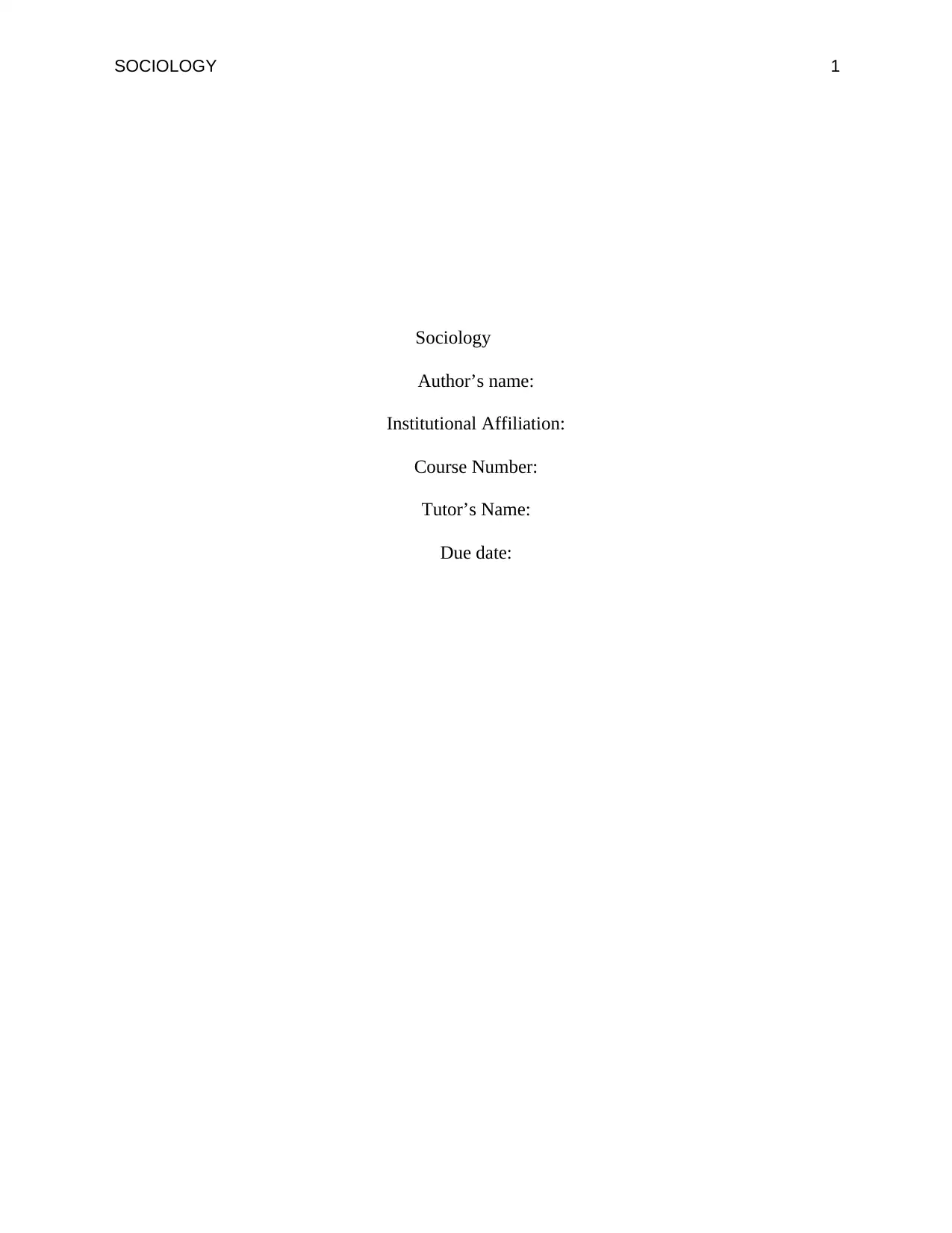
SOCIOLOGY 1
Sociology
Author’s name:
Institutional Affiliation:
Course Number:
Tutor’s Name:
Due date:
Sociology
Author’s name:
Institutional Affiliation:
Course Number:
Tutor’s Name:
Due date:
Paraphrase This Document
Need a fresh take? Get an instant paraphrase of this document with our AI Paraphraser
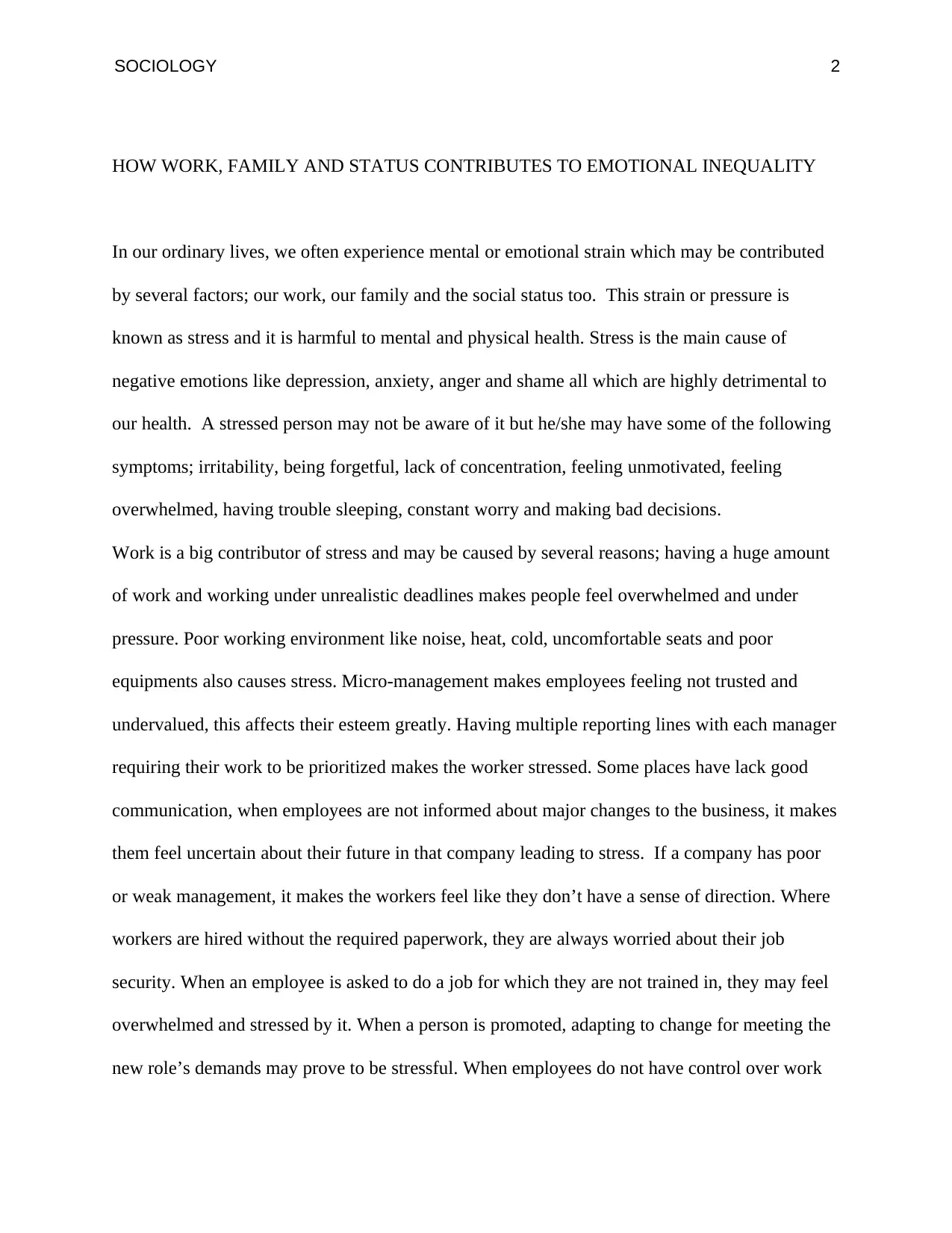
SOCIOLOGY 2
HOW WORK, FAMILY AND STATUS CONTRIBUTES TO EMOTIONAL INEQUALITY
In our ordinary lives, we often experience mental or emotional strain which may be contributed
by several factors; our work, our family and the social status too. This strain or pressure is
known as stress and it is harmful to mental and physical health. Stress is the main cause of
negative emotions like depression, anxiety, anger and shame all which are highly detrimental to
our health. A stressed person may not be aware of it but he/she may have some of the following
symptoms; irritability, being forgetful, lack of concentration, feeling unmotivated, feeling
overwhelmed, having trouble sleeping, constant worry and making bad decisions.
Work is a big contributor of stress and may be caused by several reasons; having a huge amount
of work and working under unrealistic deadlines makes people feel overwhelmed and under
pressure. Poor working environment like noise, heat, cold, uncomfortable seats and poor
equipments also causes stress. Micro-management makes employees feeling not trusted and
undervalued, this affects their esteem greatly. Having multiple reporting lines with each manager
requiring their work to be prioritized makes the worker stressed. Some places have lack good
communication, when employees are not informed about major changes to the business, it makes
them feel uncertain about their future in that company leading to stress. If a company has poor
or weak management, it makes the workers feel like they don’t have a sense of direction. Where
workers are hired without the required paperwork, they are always worried about their job
security. When an employee is asked to do a job for which they are not trained in, they may feel
overwhelmed and stressed by it. When a person is promoted, adapting to change for meeting the
new role’s demands may prove to be stressful. When employees do not have control over work
HOW WORK, FAMILY AND STATUS CONTRIBUTES TO EMOTIONAL INEQUALITY
In our ordinary lives, we often experience mental or emotional strain which may be contributed
by several factors; our work, our family and the social status too. This strain or pressure is
known as stress and it is harmful to mental and physical health. Stress is the main cause of
negative emotions like depression, anxiety, anger and shame all which are highly detrimental to
our health. A stressed person may not be aware of it but he/she may have some of the following
symptoms; irritability, being forgetful, lack of concentration, feeling unmotivated, feeling
overwhelmed, having trouble sleeping, constant worry and making bad decisions.
Work is a big contributor of stress and may be caused by several reasons; having a huge amount
of work and working under unrealistic deadlines makes people feel overwhelmed and under
pressure. Poor working environment like noise, heat, cold, uncomfortable seats and poor
equipments also causes stress. Micro-management makes employees feeling not trusted and
undervalued, this affects their esteem greatly. Having multiple reporting lines with each manager
requiring their work to be prioritized makes the worker stressed. Some places have lack good
communication, when employees are not informed about major changes to the business, it makes
them feel uncertain about their future in that company leading to stress. If a company has poor
or weak management, it makes the workers feel like they don’t have a sense of direction. Where
workers are hired without the required paperwork, they are always worried about their job
security. When an employee is asked to do a job for which they are not trained in, they may feel
overwhelmed and stressed by it. When a person is promoted, adapting to change for meeting the
new role’s demands may prove to be stressful. When employees do not have control over work
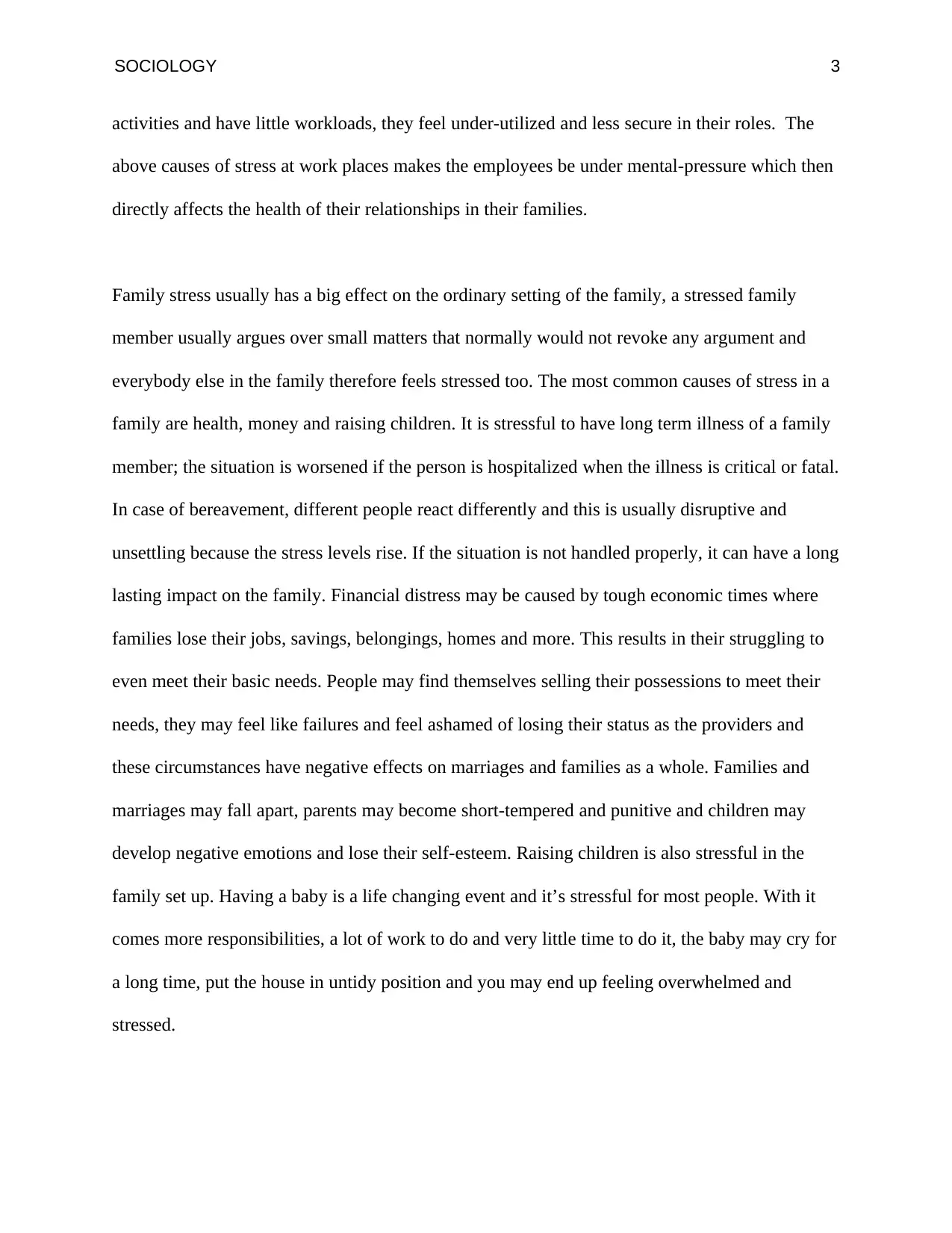
SOCIOLOGY 3
activities and have little workloads, they feel under-utilized and less secure in their roles. The
above causes of stress at work places makes the employees be under mental-pressure which then
directly affects the health of their relationships in their families.
Family stress usually has a big effect on the ordinary setting of the family, a stressed family
member usually argues over small matters that normally would not revoke any argument and
everybody else in the family therefore feels stressed too. The most common causes of stress in a
family are health, money and raising children. It is stressful to have long term illness of a family
member; the situation is worsened if the person is hospitalized when the illness is critical or fatal.
In case of bereavement, different people react differently and this is usually disruptive and
unsettling because the stress levels rise. If the situation is not handled properly, it can have a long
lasting impact on the family. Financial distress may be caused by tough economic times where
families lose their jobs, savings, belongings, homes and more. This results in their struggling to
even meet their basic needs. People may find themselves selling their possessions to meet their
needs, they may feel like failures and feel ashamed of losing their status as the providers and
these circumstances have negative effects on marriages and families as a whole. Families and
marriages may fall apart, parents may become short-tempered and punitive and children may
develop negative emotions and lose their self-esteem. Raising children is also stressful in the
family set up. Having a baby is a life changing event and it’s stressful for most people. With it
comes more responsibilities, a lot of work to do and very little time to do it, the baby may cry for
a long time, put the house in untidy position and you may end up feeling overwhelmed and
stressed.
activities and have little workloads, they feel under-utilized and less secure in their roles. The
above causes of stress at work places makes the employees be under mental-pressure which then
directly affects the health of their relationships in their families.
Family stress usually has a big effect on the ordinary setting of the family, a stressed family
member usually argues over small matters that normally would not revoke any argument and
everybody else in the family therefore feels stressed too. The most common causes of stress in a
family are health, money and raising children. It is stressful to have long term illness of a family
member; the situation is worsened if the person is hospitalized when the illness is critical or fatal.
In case of bereavement, different people react differently and this is usually disruptive and
unsettling because the stress levels rise. If the situation is not handled properly, it can have a long
lasting impact on the family. Financial distress may be caused by tough economic times where
families lose their jobs, savings, belongings, homes and more. This results in their struggling to
even meet their basic needs. People may find themselves selling their possessions to meet their
needs, they may feel like failures and feel ashamed of losing their status as the providers and
these circumstances have negative effects on marriages and families as a whole. Families and
marriages may fall apart, parents may become short-tempered and punitive and children may
develop negative emotions and lose their self-esteem. Raising children is also stressful in the
family set up. Having a baby is a life changing event and it’s stressful for most people. With it
comes more responsibilities, a lot of work to do and very little time to do it, the baby may cry for
a long time, put the house in untidy position and you may end up feeling overwhelmed and
stressed.
⊘ This is a preview!⊘
Do you want full access?
Subscribe today to unlock all pages.

Trusted by 1+ million students worldwide
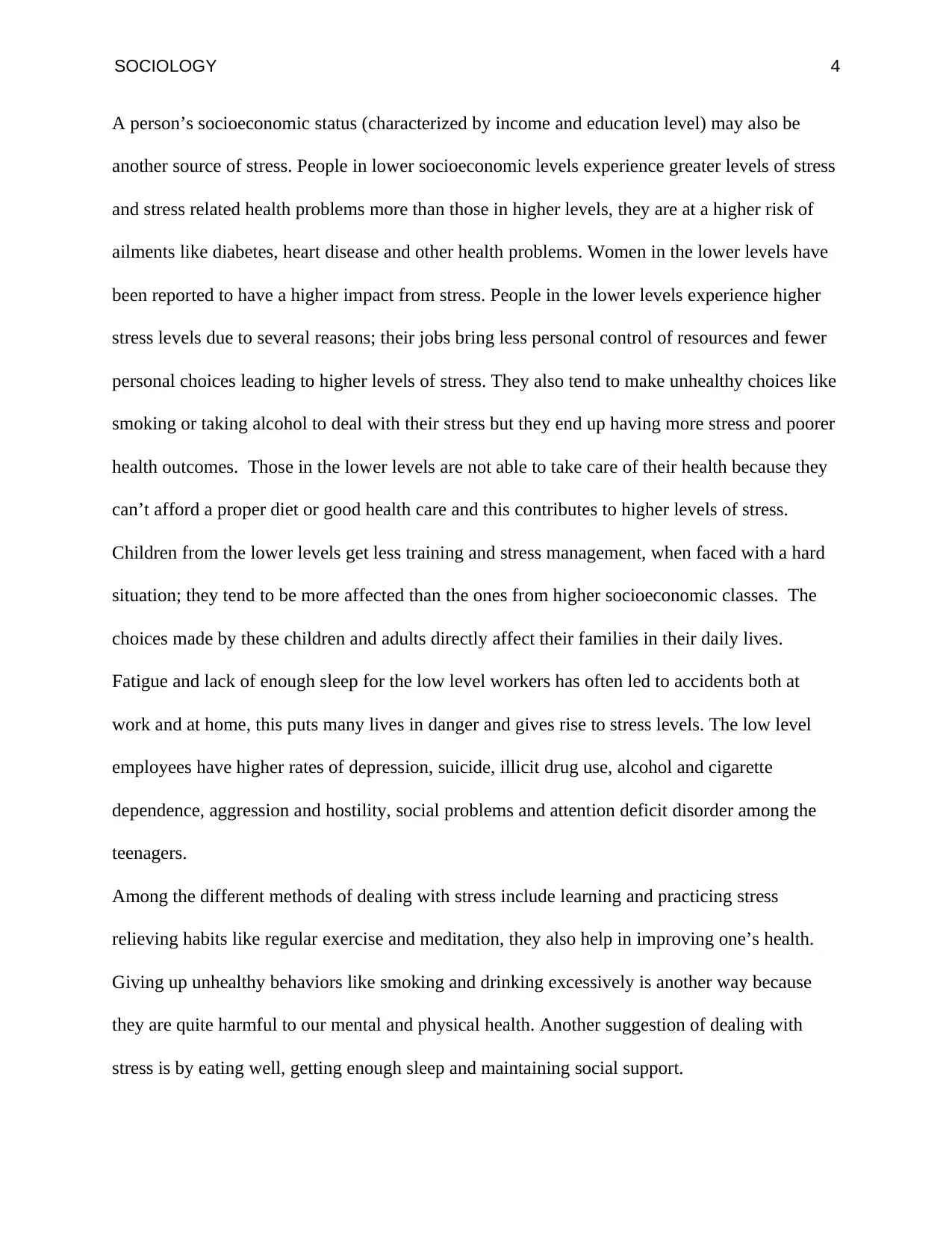
SOCIOLOGY 4
A person’s socioeconomic status (characterized by income and education level) may also be
another source of stress. People in lower socioeconomic levels experience greater levels of stress
and stress related health problems more than those in higher levels, they are at a higher risk of
ailments like diabetes, heart disease and other health problems. Women in the lower levels have
been reported to have a higher impact from stress. People in the lower levels experience higher
stress levels due to several reasons; their jobs bring less personal control of resources and fewer
personal choices leading to higher levels of stress. They also tend to make unhealthy choices like
smoking or taking alcohol to deal with their stress but they end up having more stress and poorer
health outcomes. Those in the lower levels are not able to take care of their health because they
can’t afford a proper diet or good health care and this contributes to higher levels of stress.
Children from the lower levels get less training and stress management, when faced with a hard
situation; they tend to be more affected than the ones from higher socioeconomic classes. The
choices made by these children and adults directly affect their families in their daily lives.
Fatigue and lack of enough sleep for the low level workers has often led to accidents both at
work and at home, this puts many lives in danger and gives rise to stress levels. The low level
employees have higher rates of depression, suicide, illicit drug use, alcohol and cigarette
dependence, aggression and hostility, social problems and attention deficit disorder among the
teenagers.
Among the different methods of dealing with stress include learning and practicing stress
relieving habits like regular exercise and meditation, they also help in improving one’s health.
Giving up unhealthy behaviors like smoking and drinking excessively is another way because
they are quite harmful to our mental and physical health. Another suggestion of dealing with
stress is by eating well, getting enough sleep and maintaining social support.
A person’s socioeconomic status (characterized by income and education level) may also be
another source of stress. People in lower socioeconomic levels experience greater levels of stress
and stress related health problems more than those in higher levels, they are at a higher risk of
ailments like diabetes, heart disease and other health problems. Women in the lower levels have
been reported to have a higher impact from stress. People in the lower levels experience higher
stress levels due to several reasons; their jobs bring less personal control of resources and fewer
personal choices leading to higher levels of stress. They also tend to make unhealthy choices like
smoking or taking alcohol to deal with their stress but they end up having more stress and poorer
health outcomes. Those in the lower levels are not able to take care of their health because they
can’t afford a proper diet or good health care and this contributes to higher levels of stress.
Children from the lower levels get less training and stress management, when faced with a hard
situation; they tend to be more affected than the ones from higher socioeconomic classes. The
choices made by these children and adults directly affect their families in their daily lives.
Fatigue and lack of enough sleep for the low level workers has often led to accidents both at
work and at home, this puts many lives in danger and gives rise to stress levels. The low level
employees have higher rates of depression, suicide, illicit drug use, alcohol and cigarette
dependence, aggression and hostility, social problems and attention deficit disorder among the
teenagers.
Among the different methods of dealing with stress include learning and practicing stress
relieving habits like regular exercise and meditation, they also help in improving one’s health.
Giving up unhealthy behaviors like smoking and drinking excessively is another way because
they are quite harmful to our mental and physical health. Another suggestion of dealing with
stress is by eating well, getting enough sleep and maintaining social support.
Paraphrase This Document
Need a fresh take? Get an instant paraphrase of this document with our AI Paraphraser
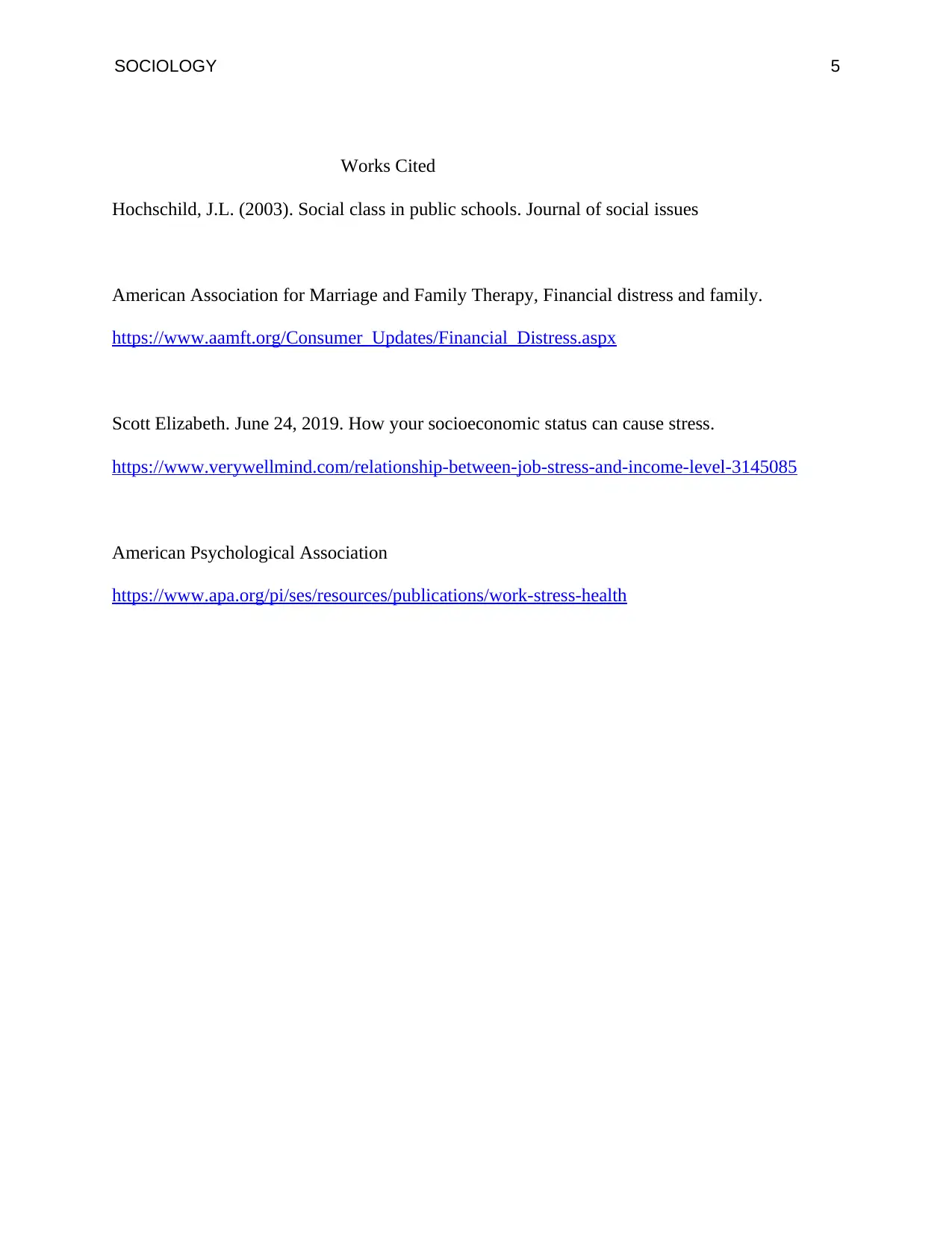
SOCIOLOGY 5
Works Cited
Hochschild, J.L. (2003). Social class in public schools. Journal of social issues
American Association for Marriage and Family Therapy, Financial distress and family.
https://www.aamft.org/Consumer_Updates/Financial_Distress.aspx
Scott Elizabeth. June 24, 2019. How your socioeconomic status can cause stress.
https://www.verywellmind.com/relationship-between-job-stress-and-income-level-3145085
American Psychological Association
https://www.apa.org/pi/ses/resources/publications/work-stress-health
Works Cited
Hochschild, J.L. (2003). Social class in public schools. Journal of social issues
American Association for Marriage and Family Therapy, Financial distress and family.
https://www.aamft.org/Consumer_Updates/Financial_Distress.aspx
Scott Elizabeth. June 24, 2019. How your socioeconomic status can cause stress.
https://www.verywellmind.com/relationship-between-job-stress-and-income-level-3145085
American Psychological Association
https://www.apa.org/pi/ses/resources/publications/work-stress-health
1 out of 5
Related Documents
Your All-in-One AI-Powered Toolkit for Academic Success.
+13062052269
info@desklib.com
Available 24*7 on WhatsApp / Email
![[object Object]](/_next/static/media/star-bottom.7253800d.svg)
Unlock your academic potential
Copyright © 2020–2026 A2Z Services. All Rights Reserved. Developed and managed by ZUCOL.




